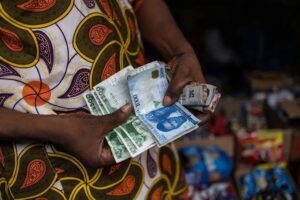As of August 2, 2024, the exchange rate for the U.S. dollar to the Nigerian naira in the black market, commonly referred to as the parallel market, has seen notable activity. According to reports from Bureau De Change (BDC) operators in Lagos, the buying rate for the dollar stands at N1600, while the selling rate is N1610. This reflects the ongoing fluctuations in the currency market, which are influenced by various economic factors.

The black market exchange rates often differ significantly from the official rates set by the Central Bank of Nigeria (CBN). For comparison, the CBN’s rates for the dollar are slightly lower, with a buying rate of N1599 and a selling rate of N1600. This disparity highlights the challenges faced by individuals and businesses seeking foreign currency in Nigeria, where the demand for dollars often exceeds the supply available through official channels.
The black market, while not officially recognized by the CBN, plays a crucial role in the Nigerian economy. Many individuals and businesses turn to this market for their foreign exchange needs, particularly when they encounter difficulties accessing dollars through banks. The rates in the parallel market are often higher due to the increased demand and limited supply, making it a vital source for those needing immediate access to foreign currency.
In addition to the exchange rate updates, recent reports from the National Bureau of Statistics (NBS) reveal that the cost of living in Nigeria continues to rise. In June 2024, Nigerians spent an average of ₦1,241 to afford one healthy square meal, marking a significant increase from ₦1,041 in May. This 19.2% rise in food costs underscores the economic pressures many Nigerians face, exacerbated by the fluctuating exchange rates and inflation.
The NBS’s Cost of a Healthy Diet (CoHD) report indicates that the price of a healthy meal varies across regions, with residents in the South West spending the most at ₦1,545, while those in the North East spend around ₦956. This disparity highlights the regional differences in food availability and pricing, which are influenced by factors such as transportation costs and local agricultural productivity.
The rising cost of living, coupled with the challenges of accessing foreign currency, has led to increased scrutiny of Nigeria’s economic policies. Many citizens are calling for more robust measures to stabilize the naira and improve access to essential goods and services. The government’s efforts to regulate the forex market and curb inflation will be critical in addressing these ongoing challenges.
As the dollar to naira exchange rates continue to fluctuate, both in the black market and through official channels, it is essential for individuals and businesses to stay informed. Understanding these rates can help in making better financial decisions, whether for personal use or business transactions.
The current exchange rates for the dollar to naira in the black market reflect the complexities of Nigeria’s economic landscape. With the ongoing challenges of inflation and rising living costs, the need for effective economic policies and strategies to stabilize the currency and improve access to essential resources remains paramount. As the situation evolves, stakeholders will be watching closely to see how these dynamics play out in the coming months.




